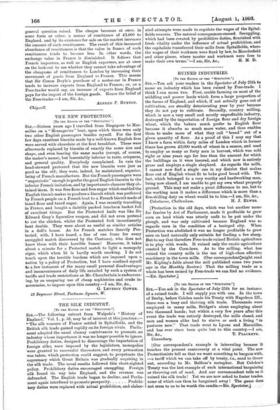RUINED INDUSTRIES.
[To THE EDITOR Or THE " SPECTATOR."
SIR,—You ask your readers in the Spectator of July 25th to name an industry which has been ruined by Free-trade. I think I can name two. First, arable farming on most of the middling and poorer lands which form a large proportion of the farms of England, and which, if not actually gone out of cultivation, are steadily deteriorating year by year because they do not pay to cultivate. Secondly, country milling, which is now a very small and mostly unprofitable industry, destroyed by the importation of foreign flour and dry foreign wheat, which the bakers much prefer to English flour because it absorbs so much more water, and thus enables them to make more of what they call " bread " out of a given quantity of flour. Ai a proof of this I may say that I know a farm within forty miles of London which in former times has grown £3,000 worth of wheat in a season, and used to employ as many as forty men in harvest, which was sold eight or nine years ago for less than the amount for which the buildings on it were insured, and which now is entirely grass and employs a single shepherd. As regards the mills, I cannot now find- a single one in my district that makes flour out of English wheat fit to bake good bread with. The last, which belonged to a very worthy and hardworking man, being now closed, I am unable to get my own wheat properly ' ground. This may not make a great difference to me, but to the working man it makes a difference which is more than a five-shilling duty on wheat would be to him.—I am, Sir, &c., [Protection in the old days, which was but another name for famine by Act of Parliament, made it profitable to grow corn on land which was utterly unfit to be put under the plough, and was only cultivated because England was as regards corn in the condition of a besieged city. When Protection was abolished it was no longer profitable to grow corn on land naturally only suitable for feeding a few sheep. But to say that therefore Free-trade ruined British agriculture is to play with words. It ruined only the exotic agriculture created by the Corn-laws. As to the milling, what has ruined the country mills is the use of high-class effective machinery in the town mills. (Our correspondent:might read Mr. Siplines fable about the mill published some two years ago in. the Monthly Review.) That the milling trade as a whole has been ruined by Free-trade we can find no evidence.
— ED. Spectator.]






































 Previous page
Previous page